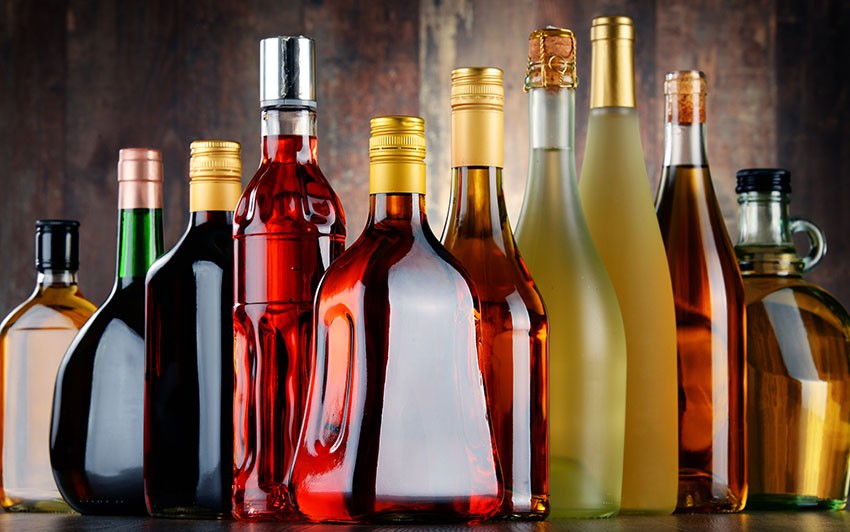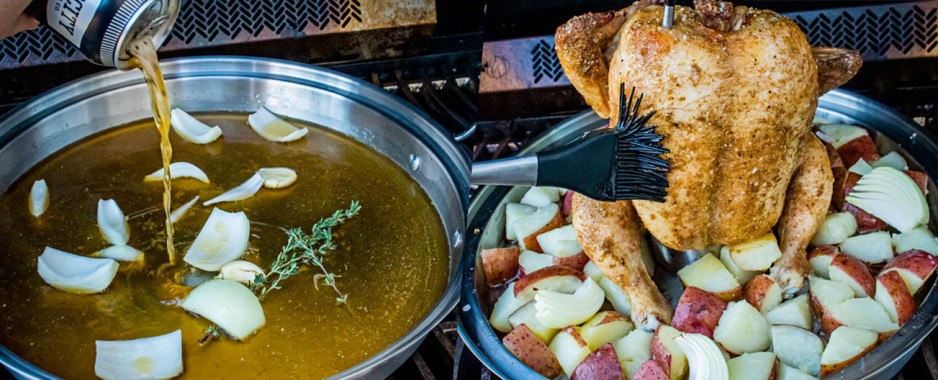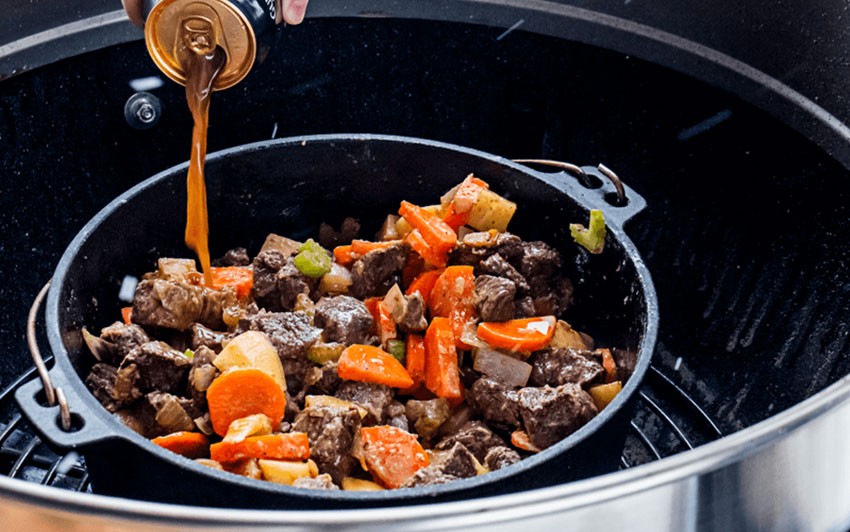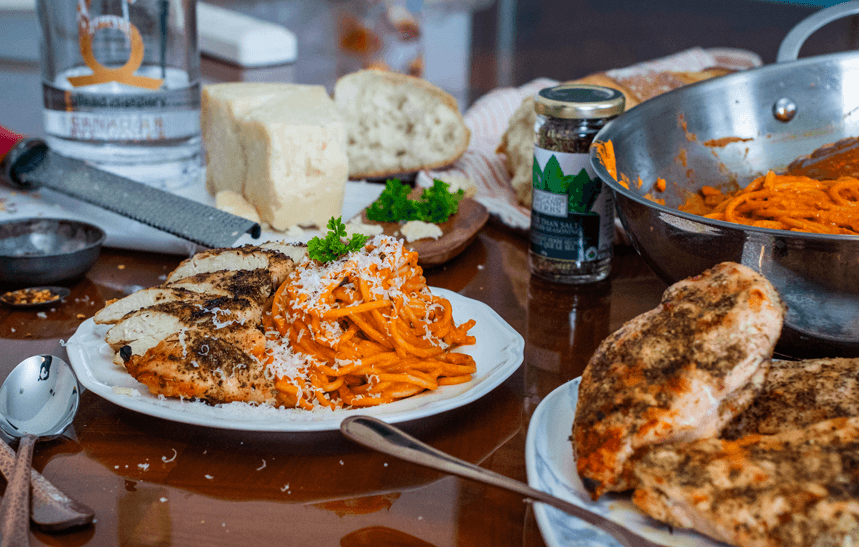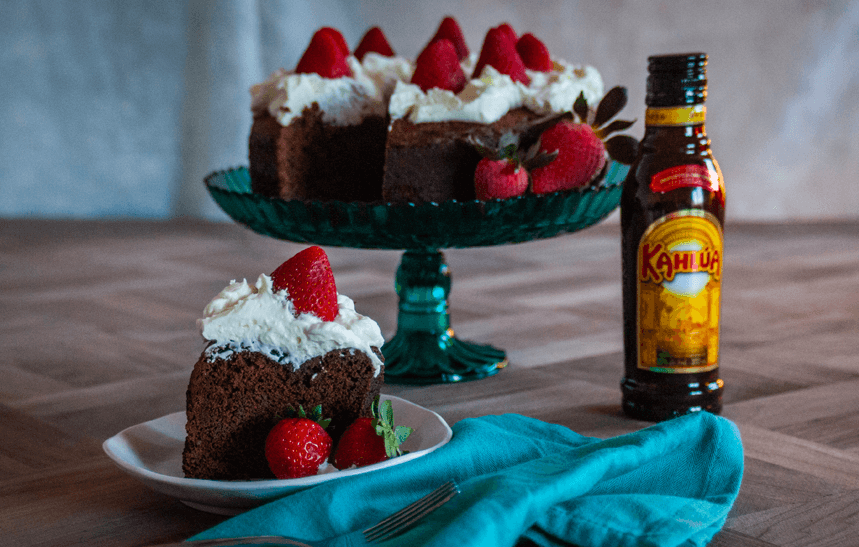
Cooking with Alcohol | What Really Happens
Ingredients have power over the way your meal tastes. The quality of not only the base components but the tools, like your beautiful Napoleon BBQ, will have a direct impact on the final product. This is where adding alcohol to the lineup of your ingredients comes into play. Find out, as you read further, what really happens when you cook with alcohol.
Why you Should be Cooking with Alcohol
Wine and spirits are amazing in the glass, but have you considered adding some to your favorite cooked dishes? Alcohol is an amazing flavor enhancement to not just food in general, but baked dishes as well. How does it do this? Alcohol - wines, spirits, and liqueurs - are considered volatile compounds because they evaporate at a lower temperature. They also bond with both water and fat molecules making them a fantastic carrier of both aroma and taste. Many spices are fat soluble, which means that they smell and taste better when fat is added. Flavors that you experience on your tongue have been carried there by either water or fat. When alcohol of any sort is added as an ingredient it serves to both deepen the flavors in the dish itself as well as enhances the experience of those flavors. It does this by acting as a bridge between your olfactory and physical sense of taste while also bonding with fat molecules. Alcohol evaporates quickly even after cooking, bringing the fragrance to your sense of smell, and using the water molecules of a dish to expand the depth of flavor.
All alcohols evaporate at a lower temperature. That is, 173°F (78°C) as opposed to water’s 212°F (100°C), however, any alcohol will begin evaporating any time it’s exposed to air. That being said, alcohol in cooked dishes doesn’t completely dissipate when it is cooked off. The other ingredients, temperature used, time, cooking vessel or method, and even the specific booze itself will determine the amount of actual alcohol left in a dish. While alcohol does remain in the dish after cooking, there should not be enough there to intoxicate you. The amount used in dishes is already small enough that even the lightest of lightweights will not feel any alcoholic effects even if left uncooked. Caution and care should still be exercised when children or others who may not choose to partake are involved.
Amber Ale Chicken with Roasted Potatoes
Whether it's a weeknight or a family dinner, this recipe for Amber Ale Chicken with Roasted Potatoes is easy and sure to please. Imagine making a beer can chicken without having to remove the dangerous, hot beer can, while simultaneously roasting the best potatoes ever. Buy the PRO Chicken Infusion Roaster and try this delicious recipe!
Does Alcohol Cook Off?
The answer is, no. Unless you are going in for the longest of long-haul cooks, a smoked brisket or simmering a stew or sauce for hours and hours, alcohol in any dish will not cook out entirely. The physical amount of alcohol that is left in a cooked dish depends entirely on the alcohol by volume (ABV). This is a universal standard that is used worldwide to determine the amount of ethyl alcohol in milliliters present in 100 ml of an alcoholic beverage. Any alcohol present in a dish that has been baked or simmered will retain up to 75% of its alcoholic nature when flambéed, 40% after cooking for 15 minutes, 35% after 30 minutes, 25% after an hour and approximately 5% after 2½ hours.
When to Use Alcohol in Cooking
Unless otherwise called for, alcohol should generally be added early in the cooking process, or when building base before cooking. If added too late in the process, the alcohol will not be cooked down and the burning harshness will remain instead of your chosen beverage caramelizing, concentrating, and mellowing out to create depth and deliciousness. Remember, though, a little goes a long way.
-
Alcohol can be useful in most cooking. When water is called for, try substituting in an equal amount of beer, wine, or spirits, whichever seems appropriate for the dish you are preparing.
-
Rescue fruit that may be a little overripe by soaking said fruit in a wine that is complementary. Wine that is too sweet on its own can become a beautiful cocktail with fruit that is a little too ripe as well.
-
Instead of water or stock, use a dry wine, whisky, bourbon, beer, or other spirit to deglaze a pan. This will create a pan sauce that is exploding with deep flavors.
-
Take desserts up a notch or six by adding alcohol to your favorite batters or using wine or whisky in a caramel.
-
Deglaze your favorite soups, stews, and braises with alcohol before adding the other liquid components to increase flavor.
-
When adding any alcohol to gravy, add it just after the flour in your roux has cooked off but before adding the other liquid ingredients.
Chicken Alla Vodka with Spaghetti
You will want to dig in, eating as fast as you can - because it is so delicious, but at the same time want to be refined and delicate about this fancy meal.
Barbecue Baked Sticky Toffee Pudding
Adding alcohol to desserts can take them to whole new levels. Try grilling up this Maple-Whisky Sticky Toffee Pudding Cake.
Bacon Bourbon Chocolate Chip Cookies
Adding Bourbon to these delicious Cookies takes them up several notches.
Kahlua Chocolate Cake with Strawberries & Cream
Kahlua pairs so well with chocolate, so it's no surprise this cake is so good.
Can you Use Alcohol in Marinade?
Using a splash of your favorite drink in a marinade can really enhance a meal. Be aware that any acids or enzymes found in the base components of the alcohol can denature the protein for tenderization, however, it’s not likely to be the most active ingredient in your marinade. Instead, the alcohol will bond with the fat and water to enhance the aromatics, making the food taste and smell better. Just remember to use the basic rules of marinating.
What Alcohols to Use in Cooking
What alcohols should you use when cooking? A better question would be, which would you be comfortable serving to your friends and family? When cooking with any alcohol - wine, beer, spirit – it is best to use anything you wouldn’t mind drinking or serving to someone. Select something that is a comfortable price-to-flavor ratio for your personal tastes. When it comes to drink with a high price tag, the important and careful work that went into making it delicious would be lost on your food. Instead, use something less expensive than that, opting to pair this pricy drink with the food you cooked.
-
Cooking wine can be used for cooking, however, it is full of salt and preservatives, which can lead to salty meals when used.
-
It is recommended to use dark liquids, like red wine, on dark meats like beef and venison. Red wine pairs well with heavier and richer foods, desserts, stews, sauces, and braises, as well as chocolate desserts.
-
Light spirits and white wine pairs better with lighter meats like poultry and fish. Cream sauces, pasta, seafood, and steaming.
-
The above two rules can be bent when a recipe calls for it or you feel like it would work out.
-
When cooking with wine, it is preferable to cook with dry varieties, Sauvignon, Pino Grigio, Chardonnay, Merlot, Cabernet, and Pino Noir.
What will you Cook with Alcohol?
When you add your favorite drink to a meal, there is no end to the enhancements you can create in a meal. From marinades to the finishing sauce, adding wine, beer, whiskies, or liqueurs can turn a meal from pretty good to amazing. Now that you know what really happens when you cook with alcohol, what recipe will you create? Share your stories about cooking with alcohol, your recipe recipes, and photos with us on social pages like Facebook and Tiktok using the hashtags #NapoleonEats and #NapoleonGrills.
